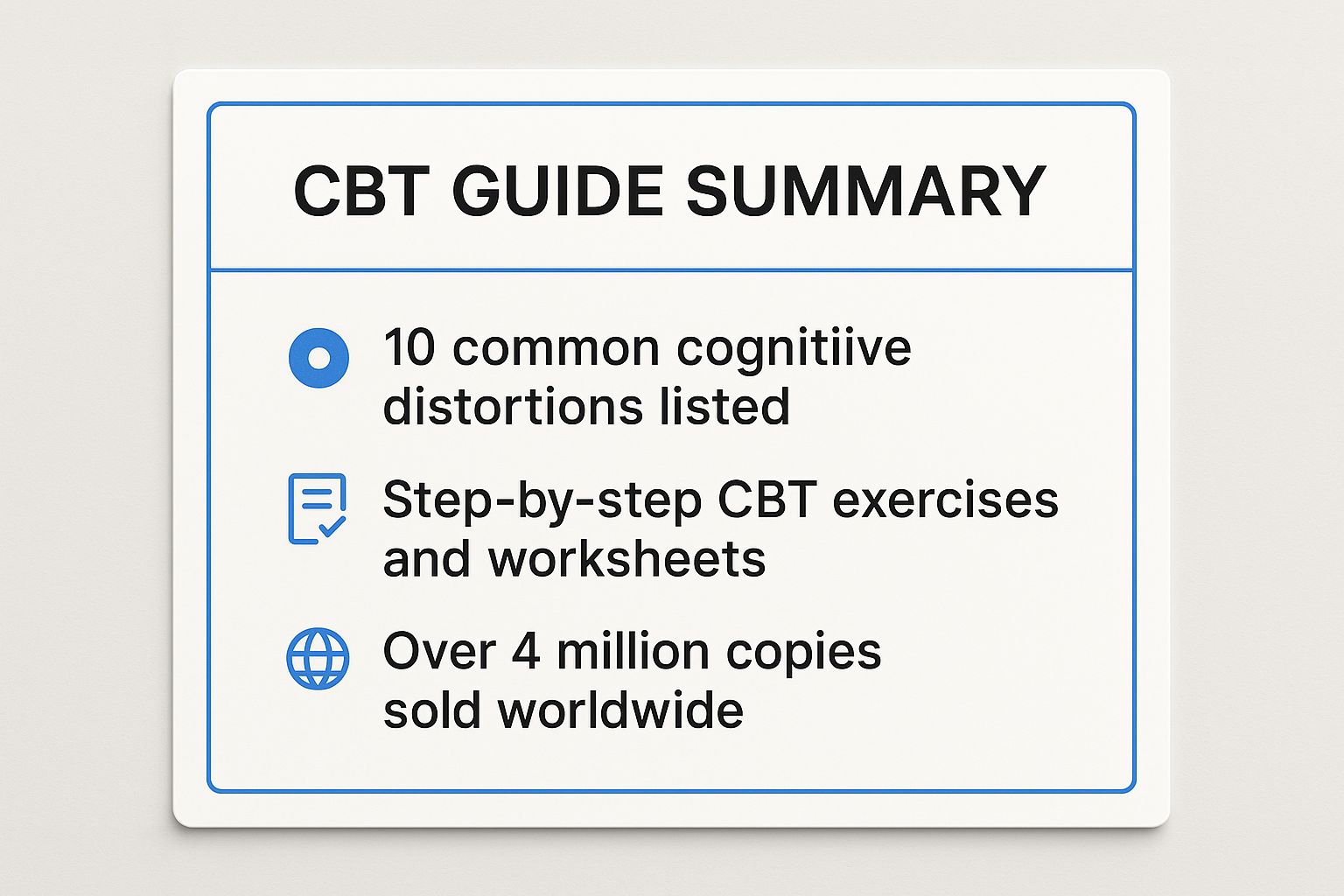Navigating your inner world can be challenging, but you don't have to do it alone. In places like India, where conversations about mental health are opening up, finding supportive resources is a vital step toward greater well-being. Books can be wonderful companions on this journey, offering insights to build resilience, manage workplace stress, or simply find more happiness.
This list of the best books on mental health is a starting point for your exploration. It includes resources for understanding challenges like depression and anxiety, as well as guides for cultivating self-compassion and a growth mindset. To deepen your understanding, you can explore expert insights on understanding and assessing your mental health.
These books provide valuable information, but they are not a substitute for professional diagnosis or care. They are designed to support, not replace, guidance from a mental health expert. If you are struggling, seeking therapy or counselling is a powerful step toward healing.
1. Feeling Good: The New Mood Therapy
Dr. David Burns' Feeling Good: The New Mood Therapy makes Cognitive Behavioural Therapy (CBT) accessible to everyone. Therapists often recommend this book because it provides a clear, practical approach to managing your moods. It teaches you how to identify and reframe the unhelpful thought patterns that can lead to depression and anxiety.
The book is based on a simple idea: your thoughts influence your feelings. By learning to change how you think, you can change how you feel, building resilience and improving your overall well-being. Its techniques are especially useful for managing workplace stress and persistent low moods.
How to Apply Its Teachings
To benefit from Feeling Good, consistent practice is helpful. Try integrating these exercises into your routine:
- Complete the Daily Mood Log: This tool helps you connect your moods to the specific thoughts that trigger them.
- Identify Cognitive Distortions: Learn to recognize common thinking patterns, like "all-or-nothing thinking," in your daily life.
- Talk Back to Your Thoughts: Actively challenge negative thoughts with more balanced and realistic responses.
This infographic summarises the book's core concepts, including the cognitive distortions it helps you identify and its global impact.

The book's structured exercises have made it a trusted resource for improving mental health through therapy and self-guided practice.
Dr. Burns explains how these simple yet powerful CBT techniques can help you improve your emotional state.
2. The Body Keeps the Score
Dr. Bessel van der Kolk’s The Body Keeps the Score transformed our understanding of trauma. The book explains how difficult experiences can affect our brains and bodies, influencing our emotions and even our physical health. It shows why approaches that include the body are often essential for healing, moving beyond traditional talk therapy.

A key insight is that trauma is stored in the body, not just in our memories. The book introduces healing methods like yoga and EMDR that help reconnect the mind and body. It is one of the best books on mental health for anyone who has experienced trauma, their loved ones, and professionals seeking a deeper understanding.
How to Apply Its Teachings
This book deals with sensitive topics, so it's important to approach it with care. Consider these steps:
- Read with a Support System: Discuss your thoughts and feelings with a trusted friend, family member, or therapist.
- Take Breaks: If the content feels overwhelming, pause and practice grounding techniques like deep breathing.
- Focus on Relevant Chapters: You don't have to read it all at once. Start with the sections that feel most applicable to you.
- Work with a Professional: This book is a great companion to therapy. A professional can help you process its insights in a safe and supportive way.
3. Mindset: The New Psychology of Success
Dr. Carol Dweck's Mindset: The New Psychology of Success is a powerful book about personal growth and resilience. It introduces the concepts of the "fixed mindset" and the "growth mindset." This book is often recommended in therapy and counselling because of its practical approach to overcoming challenges.
The core idea is that our beliefs about our abilities shape our lives. A fixed mindset assumes our talents are unchangeable, which can create a fear of failure. In contrast, a growth mindset views challenges as opportunities to learn and grow, which is key for building resilience and managing anxiety or workplace stress.
How to Apply Its Teachings
Adopting a growth mindset takes conscious effort. You can start with these simple steps:
- Use 'Yet' Language: When you face a challenge, add the word "yet" to your thoughts. For example, change "I can't do this" to "I can't do this yet."
- Focus on Process, Not Just Outcome: Acknowledge your effort and strategies, not just the final result. This builds long-term resilience.
- Embrace Imperfection: See mistakes as valuable learning opportunities, not as reflections of your worth.
This infographic shows the key differences between a fixed and a growth mindset.
Adopting a growth mindset is linked to greater achievement and well-being, making it a cornerstone of modern personal development.
Dr. Dweck explains how this powerful shift in mindset can change how we approach challenges and lead to greater success.
4. The Gifts of Imperfection
Brené Brown's The Gifts of Imperfection is a guide to living a more authentic life by embracing who you are. The book challenges the pressure to be perfect and offers a compassionate way to build self-acceptance. It is one of the best books on mental health for anyone looking to cultivate courage and connection.
The central message is that vulnerability is a sign of strength, not weakness. Brown provides ten guideposts for living with more authenticity and resilience. This book offers a path away from perfectionism toward a life with more joy, making it helpful for those dealing with anxiety or low self-worth.
How to Apply Its Teachings
Living more wholeheartedly is a daily practice. Here are a few ways to start:
- Practise Self-Compassion: When you're having a hard time, treat yourself with the same kindness you would offer a friend.
- Cultivate Gratitude and Joy: Keep a journal to notice moments of gratitude, which can help shift your perspective.
- Set Boundaries and Say No: Protect your energy by setting clear limits in your relationships and commitments.
- Embrace Creativity and Play: Make time for activities you enjoy, just for the sake of doing them.
5. Maybe You Should Talk to Someone
Lori Gottlieb's Maybe You Should Talk to Someone offers a warm and insightful look into the world of therapy. The book shares stories from her work as a therapist while also documenting her own experience seeking counselling. It explores universal human experiences like love and loss, making it one of the best books on mental health for anyone curious about therapy.
The book’s power lies in its ability to normalise seeking support for your mental well-being. By showing that everyone, including therapists, has vulnerabilities, Gottlieb helps reduce stigma. It's a reassuring read for anyone considering therapy or wanting to better understand their own emotions.
How to Apply Its Teachings
You can use this book as a tool for personal reflection. Here are a few ideas:
- Normalise Your Experience: The stories can help you see that your feelings are valid and shared by many others.
- Reflect on Your Relationships: Notice the relationship patterns described in the book and consider how they might show up in your life.
- Observe Therapeutic Dynamics: See how the therapist and client interact, which can help you think about what you might want from counselling.
- Embrace Self-Compassion: The book is a reminder that being imperfect is human, and asking for help is a sign of strength.
6. Atomic Habits
James Clear's Atomic Habits is a practical guide to building good habits that support long-term well-being. Although not strictly a mental health book, its principles are incredibly useful. It shows how small, consistent changes can lead to remarkable results, which is why it is one of the best books on mental health for creating positive routines.

The book explains a simple four-step loop for habit formation: cue, craving, response, and reward. By making small improvements, you can build supportive daily structures that promote resilience and self-care. This approach can be effective for managing symptoms of anxiety, depression, and workplace stress.
How to Apply Its Teachings
To build habits that support your mental well-being, try these practical strategies:
- Start with the Two-Minute Rule: Begin with a habit that takes less than two minutes, like meditating for 60 seconds.
- Use Habit Stacking: Link a new habit to one you already have. For example, "After my morning tea, I will stretch for two minutes."
- Focus on Identity: Instead of thinking, "I want to be less stressed," try, "I am a calm person." This makes your actions feel like a natural part of who you are.
7. The Anxiety and Worry Workbook
Written by pioneers in cognitive therapy, Dr. Aaron T. Beck and Dr. David A. Clark, this workbook is a hands-on guide for managing anxiety. It translates proven CBT techniques into clear exercises and worksheets. This makes it one of the best books on mental health for anyone who wants a structured, self-guided path to feeling better.
The book helps you systematically identify, challenge, and change the thoughts and behaviours that contribute to anxiety. It offers tools for confronting fears and managing worry using evidence-based methods. Therapists often recommend this workbook to help people build practical coping skills for anxiety and resilience.
How to Apply Its Teachings
A consistent approach helps you get the most from this workbook. Consider these steps:
- Complete the exercises consistently: Work through the activities regularly to build momentum.
- Practise during low-anxiety periods first: Build confidence with the techniques when you are calm so they are easier to use during stressful moments.
- Focus on relevant chapters: Target the sections that address your specific type of anxiety, such as social anxiety or worry.
- Combine with relaxation practices: Pair the book's cognitive techniques with mindfulness or deep breathing to help calm your nervous system.
8. Self-Compassion: The Proven Power of Being Kind to Yourself
Dr. Kristin Neff’s Self-Compassion offers a refreshing alternative to the constant pressure for high self-esteem. The book uses research to show that being kind to ourselves is essential for good mental health. It provides a gentle yet powerful framework for building emotional resilience and well-being.
The book introduces three key elements of self-compassion: self-kindness, recognizing our common humanity, and mindfulness. This approach is very helpful for dealing with anxiety, self-criticism, or the effects of past mistakes. Its teachings are widely used in therapy and mindfulness programs to foster greater well-being.
How to Apply Its Teachings
Integrating self-compassion into your life means shifting from self-judgment to self-kindness. Here are a few simple ways to begin:
- Take a Self-Compassion Break: In a difficult moment, pause to acknowledge your pain, remind yourself that everyone struggles, and offer yourself comforting words.
- Interrupt Self-Critical Thoughts: When you notice your inner critic, gently pause and reframe the thought with a kinder perspective.
- Practise Loving-Kindness Meditation: This practice helps you cultivate feelings of warmth and care toward yourself and others.
9. The Upward Spiral
Dr. Alex Korb’s The Upward Spiral uses neuroscience to explain how small actions can create positive changes in the brain. The book makes the science behind depression easy to understand. It is one of the best books on mental health for those who want a practical, science-backed approach to improving their well-being.
The core idea is that you don't need a major life change to feel better. Korb explains how small shifts in exercise, sleep, and decision-making can trigger an "upward spiral" of positive brain activity. This is an empowering resource for anyone feeling overwhelmed by depression or workplace stress, as it shows how small steps can lead to big improvements in mood and resilience.
How to Apply Its Teachings
To create an upward spiral, focus on making small, consistent changes.
- Start with One Small Action: Pick one manageable habit, like taking a 10-minute morning walk.
- Prioritise Sleep: Korb highlights the importance of sleep. Aim for a consistent schedule to help regulate your brain chemistry.
- Engage in Light Exercise: Gentle movement, like a short walk, can release mood-boosting chemicals in your brain.
- Practise Gratitude: Intentionally focusing on what you're thankful for can help rewire your brain for happiness.
10. Untamed
Glennon Doyle's memoir Untamed is a call to break free from other people's expectations and live as your true self. This book explores how trying to fit in can lead to anxiety, depression, and feeling lost. It encourages listening to your inner voice, making it one of the best books on mental health for anyone feeling unfulfilled.
The main message is that true well-being comes from living authentically. Doyle shares her personal journey to illustrate the freedom that comes from honouring your own truth. The book is especially helpful for those working to set boundaries and build a life that feels right for them.
How to Apply Its Teachings
To apply the wisdom of Untamed, focus on self-reflection and taking small, brave steps.
- Identify Your "Cages": Reflect on the expectations that make you feel confined and write them down to better understand their influence.
- Practise Listening to Your Inner Knowing: When making a decision, pause and ask yourself what you truly want.
- Dare to Disappoint: Start small by saying no to something that doesn't feel right for you. Practice honouring your own needs.
Top 10 Mental Health Books Comparison
| Title | Implementation Complexity 🔄 | Resource Requirements ⚡ | Expected Outcomes 📊 | Ideal Use Cases 💡 | Key Advantages ⭐ |
|---|---|---|---|---|---|
| Feeling Good: The New Mood Therapy | Moderate – requires self-discipline and consistent exercise completion | Low – mostly self-help tools and worksheets | Reduction in depression and anxiety symptoms through CBT | Individuals with mild to moderate depression/anxiety; supplement to therapy | Evidence-based CBT; practical exercises; accessible writing |
| The Body Keeps the Score | High – involves understanding trauma neuroscience and multiple healing modalities | High – often requires professional guidance for treatments | Trauma recovery, improved mind-body integration | Trauma survivors, PTSD treatment, veterans, complex trauma cases | Groundbreaking trauma research; diverse healing approaches |
| Mindset: The New Psychology of Success | Low – conceptual understanding with practical mindset shifts | Low – reading and mindset practice only | Enhanced resilience, growth mindset adoption across life areas | Education, workplace leadership, personal development | Wide applicability; builds resilience; reframes failure |
| The Gifts of Imperfection | Low to moderate – requires ongoing personal reflection and practice | Low – reading and practical exercises | Increased self-compassion, reduced shame and perfectionism | Those struggling with self-acceptance, shame, or vulnerability | Relatable style; combines spirituality with psychology |
| Maybe You Should Talk to Someone | Low – narrative memoir with professional insights | Low – reading only | Reduced stigma about therapy; normalized therapy process | Readers curious about therapy, mental health awareness | Engaging dual perspective; reduces therapy stigma |
| Atomic Habits | Moderate – requires consistent habit-building efforts | Low to moderate – self-application with tracking | Sustainable behavior change, improved mental health routines | Habit formation, behavioral change, self-care improvement | Clear, actionable framework; evidence-based strategies |
| The Anxiety and Worry Workbook | Moderate – structured CBT workbook needing dedication | Moderate – requires time commitment and active participation | Anxiety reduction and improved worry management | Anxiety sufferers seeking structured self-help or therapy homework | Highly practical CBT methods; structured approach |
| Self-Compassion | Low to moderate – requires regular practice of self-compassion techniques | Low – reading and meditation practice | Reduced self-criticism; improved emotional resilience | Individuals with self-esteem issues, perfectionism, trauma recovery | Research-backed; applicable across cultures |
| The Upward Spiral | Moderate – need to apply multiple neuroscience-based strategies consistently | Low to moderate – self-help with scientific explanations | Improved mood and depression symptoms | Depression management; mood improvement strategies | Neuroscience-backed; accessible explanations; practical steps |
| Untamed | Low – memoir with personal and societal reflections | Low – reading only | Increased authenticity and empowerment | Readers exploring self-identity, women’s mental health, addiction recovery | Inspiring storytelling; encourages authenticity |
Your Next Chapter in Mental Well-being
Exploring your inner world is a personal journey, and books can be wonderful guides. This list of the best books on mental health offers different paths to understanding yourself better. Whether you're learning cognitive skills from Feeling Good or embracing vulnerability with The Gifts of Imperfection, each book provides valuable tools.
Atomic Habits helps build supportive routines, while The Body Keeps the Score highlights the mind-body connection in healing. These books offer wisdom for managing challenges like anxiety, depression, and workplace stress. They remind us that well-being is a journey, not a destination.
Turning Knowledge into Action
Reading is the first step, and putting these ideas into practice is where real change begins. The goal is progress, not perfection.
- Choose One Core Idea: Pick one concept that resonated with you, like adopting a 'growth mindset' or practicing self-compassion, and focus on it for a few weeks.
- Implement a Single Practice: Try one small, actionable technique, such as a five-minute self-compassion break or challenging one negative thought.
- Share Your Learnings: Discussing what you've learned with a friend can deepen your understanding and create connection.
The Journey Continues
Embracing the lessons from these books is an act of self-care. It's about building resilience and creating a life that feels authentic. This journey is about equipping yourself with tools to navigate life’s challenges with greater awareness and compassion.
You don't have to walk this path alone. If you feel overwhelmed or simply want a safe space to explore your thoughts, seeking professional support from a therapist is a sign of strength. The right counselling can offer personalized guidance to help you on your unique journey.
Ready to translate insight into action? The journey that begins with a book can continue with a conversation. Connect with a qualified, empathetic therapist at DeTalks to explore these topics further and receive personalised support for your mental well-being. Start your journey with DeTalks today.

Leave a Reply